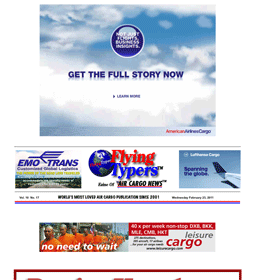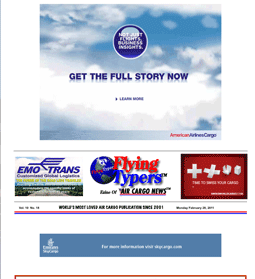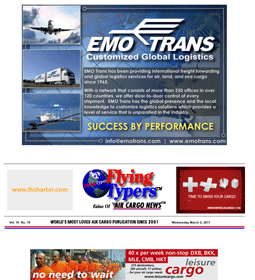 |
 |
|
| |
||
| Vol. 10 No. 20 WORLD'S MOST LOVED AIR CARGO PUBLICATION SINCE 2001 Friday March 4, 2011 |
|
Necessary Roughness:
New Rules for the Contact Sport of Business. What do you do with a room
full of truckers and forwarders and airlines?
|
Women Move Forward
|
Q: Women
in Air Cargo appear to be a new subject headlining AfA. Can you offer
a preview of the content of that session?
A: This
will be our third year offering a breakout session specifically designed
for Women in Cargo. The participants for the Women in Cargo event are
usually Regulatory (TSA, FAA), line haul carriers, passenger air carriers,
integrators, forwarders and cartage companies.
Our goal has been to provide a venue
for women to discuss industry topics that impact their careers, offer
networking opportunities for mentorship and industry development and
provide recognition for roles that are not solely focused on administration
and customer service
This year our panelists are all professionals
who have been in the industry for over 15 years. They will be speaking
to our group on the success and challenges of doing business in a global
market place as a female. Culture, language and mannerisms all play
a significant role in women having successful interaction and business
relationships in a global market. By the way, men are invited too!
Q: What
approach is AfA taking to global implementation of security next week?
A: 100%
screening of each piece cargo might make for good headlines but we believe
it does little to assure complete air cargo security. A layered approach
combining targeted screening with shipper data, shipment characteristics,
intelligence sharing and worker credentialing will be more effective
in the end.
Q: What
do you say to someone who says “I Hate the AfA?”
A: Was
it something I said??
Actually, members tell me that to know
us is to love us and if you don’t admire the AfA, clearly you
do not know us. This organization and its committed leadership have
worked tirelessly to become the recognized voice for the airfreight
forwarder in Washington. Our efforts continue to assure that forwarders
stay in business through sensible policies that keep freight moving.
Q:
You have been heading up AfA since Jim Foster died which is how many
years? Brandon, what accomplishment are you most proud of having brought
to the group?
A: Jim
Foster was the founder of the Airforwarders Association and the industry
suffered a huge loss with his passing in 2006. I learned much from the
great man whose wisdom and insight continue to guide my passion for
the industry and its people. Jim taught me that we get much more accomplished
when working with others in a cooperative fashion.
I am most proud of assisting the AfA
membership in complying with the 100% screening mandate but most of
all, the Airforwarders Association being considered the voice of the
airfreight forwarder.
Q:
Can you name some things that you would like to change
about the way air cargo does business?
A: We
talk a lot about partnerships but all too often, the participants -
forwarders, airlines, truckers, stakeholder third party organizations
- revert to adversarial self-interest. These self-inflicted barriers
prevent progress and must be overcome.
Geoffrey
More information on AirCargo click here.
|
If
You Missed Any Of The Previous 3 Issues Of FlyingTypers |
|||||
|
|||||
FT022311 |
FT030211 |
||||

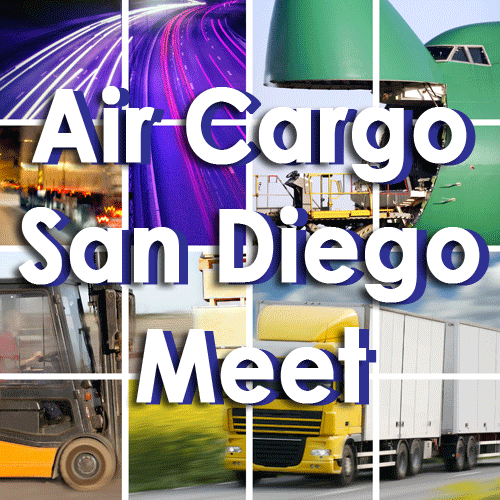
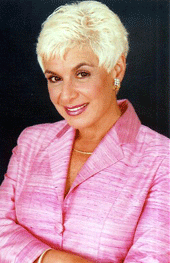
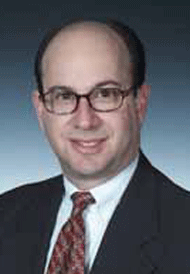 "AirCargo
claims a diverse educational program for attendees, outstanding business
opportunities for exhibitors and excellent corporate exposure for sponsors.
"AirCargo
claims a diverse educational program for attendees, outstanding business
opportunities for exhibitors and excellent corporate exposure for sponsors.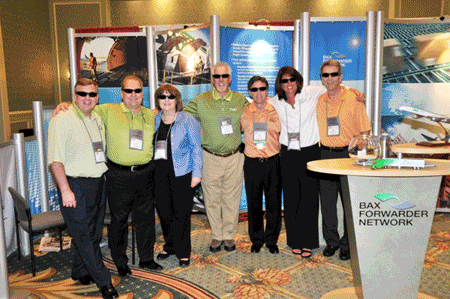 Industry performed well in the face of these difficulties, coupled with
a tough economy. The lessons learned by industry in 2010 should make
2011 a somewhat easier year for air forwarders. CCSP is working and
commerce continues to flow. The economy bounced back in 2010 after seeing
unprecedented drops in volume the year before. This economic recovery,
we hope and expect, will continue this year.
Industry performed well in the face of these difficulties, coupled with
a tough economy. The lessons learned by industry in 2010 should make
2011 a somewhat easier year for air forwarders. CCSP is working and
commerce continues to flow. The economy bounced back in 2010 after seeing
unprecedented drops in volume the year before. This economic recovery,
we hope and expect, will continue this year.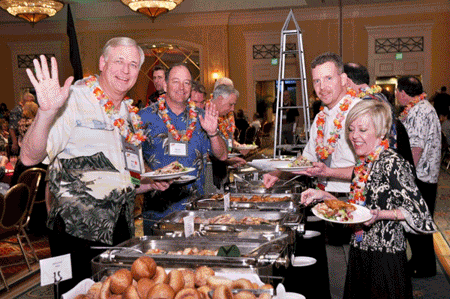 And speaking of numbers, five years ago
the AfA had about 140 members. Today our membership includes almost
400 companies with over 3,000 offices employing in excess of 20,000
people.
And speaking of numbers, five years ago
the AfA had about 140 members. Today our membership includes almost
400 companies with over 3,000 offices employing in excess of 20,000
people.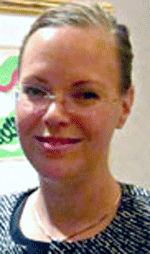 Jenni
Frigger-Latham is the newest Director of the Air Forwarders Association
Board that includes four women and eight men.
Jenni
Frigger-Latham is the newest Director of the Air Forwarders Association
Board that includes four women and eight men.
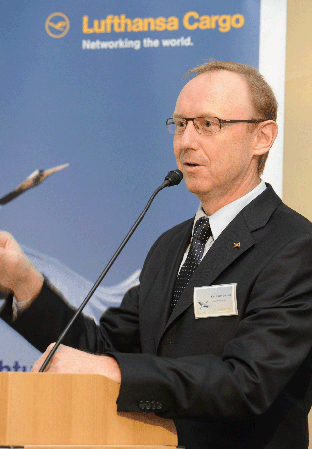 (Exclusive)—Earlier
this week in Frankfurt Lufthansa Cargo held a Climate Care Conference
advancing environmental issues and recognizing air cargo’s responsibilities
toward a better planet.
(Exclusive)—Earlier
this week in Frankfurt Lufthansa Cargo held a Climate Care Conference
advancing environmental issues and recognizing air cargo’s responsibilities
toward a better planet. Joachim
Buse, VP Aviation Biofuel, Lufthansa concurs and details the commitment:
Joachim
Buse, VP Aviation Biofuel, Lufthansa concurs and details the commitment: Lufthansa
Cargo has chosen Frank Naeve as new CEO of Shenzhen, China-headquartered
Jade Cargo International. The German airline however declined comment,
pending approval of the appointment by Jade’s Supervisory Board.
Lufthansa
Cargo has chosen Frank Naeve as new CEO of Shenzhen, China-headquartered
Jade Cargo International. The German airline however declined comment,
pending approval of the appointment by Jade’s Supervisory Board.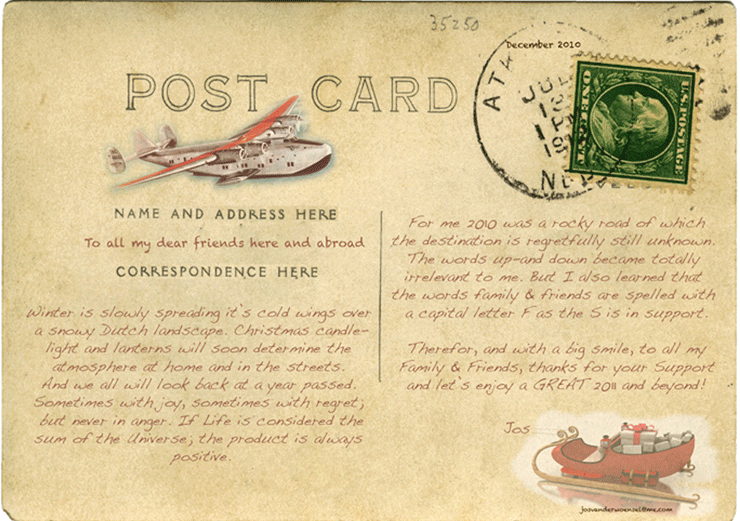
 My
dear friend in Amsterdam, Jos van der Woensel, whom I loved dearly died
March 1st and his loss is almost too much to bear right now.
My
dear friend in Amsterdam, Jos van der Woensel, whom I loved dearly died
March 1st and his loss is almost too much to bear right now.